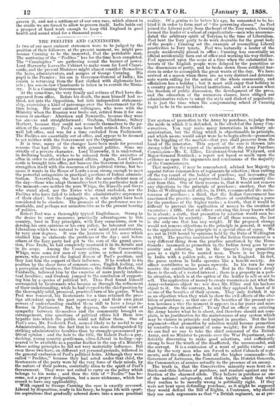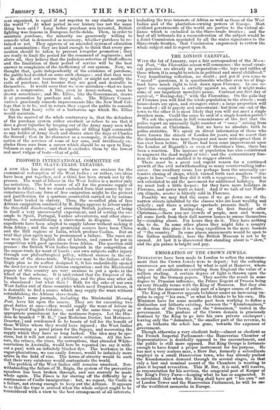THE MILITARY CONSERVATIVES.
TUE system of promotion in the Army by purchase, to judge from the mode in which it is defended, is the citadel of the Army Con- servatives. You may make many innovations in military ad- ministration, but the thing which is objectionable in principle, and which no one would adopt were he to begin afresh—promotion by the higgling of the market—that you shall preserve from the hand of the innovator. This aspect of the ease is thrown into strong relief by the report of the minority of the Army Purchase Commission—Mr. E. Ellice, Lieutenant-General Wynyard, and Major-General Bentinck ; a report not based so much upon the evidence as upon the arguments and conclusions of the majority of the Commissioners.
That majority, it may be remembered, advised her Majesty to appoint future commanders of regiments by selection ; thus cutting off the top round of the ladder of purchase, and increasing the chances of obtaining good regimental leaders. The minority dis- sent from this. One of their reasons is, that it would not remove any objections to the principle of purchase ; another, that the Duke of Wellington and others, in 1840, recommended the main- tenance of purchase ; a third, that the Indian Government has sanctioned the practice among the officers of contributing a purse for the purchase of the higher ranks ; a fourth, that it would be difficult to prevent the application of money to the creation of vacancies ; a fifth, that an officer entering the Army knows what he is about ; a sixth, that promotion by selection would soon be- come promotion by seniority. Now of all these reasons, the last is the only one that has any weight. If the proposed change would not remove objections to the principle in general, it would to the application of the principle to a special class of cases. We are not in 1858 bound by opinions held by the Duke of Wellington in 1840. The practice sanctioned by the Indian Government is a very different thing from the practice sanctioned by the Horse Guards ; inasmuch as promotion in the Indian Army goes by se- niority and selection, but in the Queen's Army promotion goes as a right to the monied man. There is no leap-frog in India with a golden pole, as there is in England. In fact, the purse system in India operates like a benefit society. An officer contributes as he passes upwards. In his turn he may receive the contributions of others. But in the Queen's Army there is the sale of a vested interest ; there is a property in a pub- lic situation, which is at the option of the holder to sell or not to sell. The application of money to create vacancies is not what the Army-reformers object to ; nor does Mr. Ellice and his backers object to it. On the contrary, he and they applaud it, boast of it as one of the beauties of their system. They only furbish it up as an objection when they wish to show the evil effects of the abo- lition of purchase ; so that one of the beauties of the present sys- tem becomes a vice the moment it appears in a far purer and more legitimate shape in another To say that an officer on entering the Army knows what he is about, and therefore should not com- plain, is no justification for the maintenance of any system which may be vicious in principle and unjust in practice. But the lost argument—that promotion by selection would become promotion by seniority—is an argument of some weight ; for it avers that we can find no one to take the chief command of the British Army, and no Minister to preside over the War Department, suf- ficiently discerning to make good selections, and sufficiently strong to bear the wrath of the disaffected, the unsuccessful, and the corrupt. It is a confession of a want of public virtue ; and. that by the very men who are forced to select Colonels of regi- ments, and the officers who hold all the higher commands—the Governors of fortresses, the Commandants, the District Generals, the Commanders of armies actually in the presence of an enemy. The truth is, that the Conservative minority were bent on a thick-and-thin defence of purchase, and resolute against any in- fraction of the charmed circle. They believe in purchase as one of the national safeguards, and thus tacitly admit that what they confess to be morally wrong is politically right. If they were not bent upon defending purchase, as it might be supposed they would defend the Bill of Rights, a l'outrance, why should they use such arguments as that "a British regiment, as at pre-
sent organized, is equal if not superior to any similar corps in the world" ? At what period in our history has not the same thing been said ? Long before purchase was invented, British fighting was famous in European battle-fields. Then, in order to maintain purchase, the minority are generously willing to concede what is demanded as necessary, whether purchase be re- tained or not. They approve of an amended system of education and examination ; they are kind enough to think that every pre- coition should be taken to prevent irregular promotion ; they are ready to limit the period for the command of regiments and above all, they believe that the judicious selection of Staff-officers and the limitation of their period of service will be the best answer to complaints of the inefficiency of our system. Now, we thought that, quite independently of the existence of purchase, the public had decided on some such changes ; and that they were to be effected not because they might or might not modify the evils of purchase, but because they are good and desirable in themselves. It would seem that we,were mistaken—that we have made a compromise. A line, even in Army-reform, must be drawn somewhere ; and Mr. Ellice, like the Government, draws it at promotion by purchase and sale. The Military Conser- vatives graciously concede improvements like the New Staff Col- lege that is to be, and in return they expect the public to concede to them that hoary relic of a barbarous age which Mr. Ellice would maintain.
But the marvel- of the whole controversy is, that the defenders Of the purchase system either overlook or refuse to see that it does a great injustice by keeping out of the Army many men who are born soldiers, and quite as capable of filling high commands as any holder of Army stock and shares since the days of Charles the Second ; that in its character as a monopoly, it defrauds the nation of the services of some of her sons, and invidiously ex- cludes those sons from a career which should be as open to Eng- lishmen as any other ; and that it excludes them by the lowest and most vulgar of tests—that of gold.



































 Previous page
Previous page